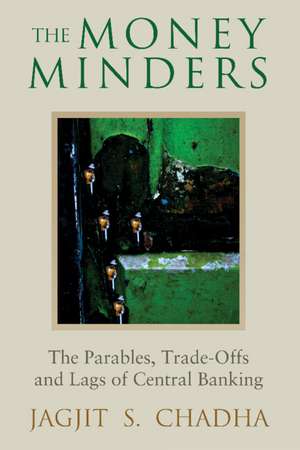The Money Minders: The Parables, Trade-offs and Lags of Central Banking
Autor Jagjit Chadhaen Limba Engleză Paperback – 23 feb 2022
| Toate formatele și edițiile | Preț | Express |
|---|---|---|
| Paperback (1) | 144.62 lei 17-23 zile | +12.52 lei 7-11 zile |
| Cambridge University Press – 23 feb 2022 | 144.62 lei 17-23 zile | +12.52 lei 7-11 zile |
| Hardback (1) | 403.06 lei 6-8 săpt. | |
| Cambridge University Press – 23 feb 2022 | 403.06 lei 6-8 săpt. |
Preț: 144.62 lei
Nou
Puncte Express: 217
Preț estimativ în valută:
27.68€ • 30.05$ • 23.25£
27.68€ • 30.05$ • 23.25£
Carte disponibilă
Livrare economică 28 martie-03 aprilie
Livrare express 18-22 martie pentru 22.51 lei
Preluare comenzi: 021 569.72.76
Specificații
ISBN-13: 9781108971812
ISBN-10: 1108971814
Pagini: 250
Ilustrații: 37 b/w illus. 2 tables
Dimensiuni: 150 x 228 x 15 mm
Greutate: 0.38 kg
Ediția:Nouă
Editura: Cambridge University Press
Colecția Cambridge University Press
Locul publicării:Cambridge, United Kingdom
ISBN-10: 1108971814
Pagini: 250
Ilustrații: 37 b/w illus. 2 tables
Dimensiuni: 150 x 228 x 15 mm
Greutate: 0.38 kg
Ediția:Nouă
Editura: Cambridge University Press
Colecția Cambridge University Press
Locul publicării:Cambridge, United Kingdom
Cuprins
1. Of gold and paper money; 2. The great depression and its legacy; 3. Fine tuning out of control; 4. A science of monetary policy; 5. Where the great experiment went wrong; 6. A new art of central banking; Epilogue 1. Why forecast?; Epilogue 2. Monetary policy in troubled times; A final word; Index.
Recenzii
'This wonderful book illuminates, entertains, explains and demystifies that most essential but rarely-understood entity, money. Above all, it demonstrates the link between money and the capacity of the state to tackle any collective problems: money fundamentally matters and so, therefore, do its minders in central banks. This book describes how central bankers think about their task, what models and evidence they use to make decisions about interest rates and other tools at their disposal - and also sets out how they should think about it.' Diane Coyle, University of Cambridge
'A book like this has been needed for a long time: a primer on money-credit theory and practice for the interested generalist, which is up to date, informed by theory without drowning in abstraction, engages with the hazards of policy making, and takes institutions seriously.' Paul Tucker, Harvard Kennedy School
'Through a fascinating series of old stories, lessons from economic history, and modern models, the author describes how central banking learned to provide stability in the value of money and financial stability. It is a must read for all students of money matters.' Michael Bordo, Rutgers Economics
'This is a great book for anyone studying monetary economics in the UK. It will be perfect for undergraduates, and even graduates would benefit from it. It covers all the main issues in a clear and accessible style, with a great use of diagrams and appropriate quotations. It provides a good read, and the analysis is well done and sensible throughout.' Charles Goodhart, London School of Economics
'… central bankers have limited political legitimacy. Here Chadha echoes Paul Tucker, former deputy governor of the Bank of England, about the need for central bankers to leave responsibility for picking winners and losers to politicians. The best central bankers can hope to achieve is 'stability'. Chadha finishes his book with a warning about how long it will take for the Bank of England to recover from its exertions in response to the financial crisis and the pandemic; he also calls for a broad reconsideration of its mandate. Both issues are at the top of the political agenda in Britain. Chadha's argument is essential reading for anyone seeking to understand that debate.' Survival: Global Politics and Strategy, vol. 64, no. 5, October–November 2022
'A book like this has been needed for a long time: a primer on money-credit theory and practice for the interested generalist, which is up to date, informed by theory without drowning in abstraction, engages with the hazards of policy making, and takes institutions seriously.' Paul Tucker, Harvard Kennedy School
'Through a fascinating series of old stories, lessons from economic history, and modern models, the author describes how central banking learned to provide stability in the value of money and financial stability. It is a must read for all students of money matters.' Michael Bordo, Rutgers Economics
'This is a great book for anyone studying monetary economics in the UK. It will be perfect for undergraduates, and even graduates would benefit from it. It covers all the main issues in a clear and accessible style, with a great use of diagrams and appropriate quotations. It provides a good read, and the analysis is well done and sensible throughout.' Charles Goodhart, London School of Economics
'… central bankers have limited political legitimacy. Here Chadha echoes Paul Tucker, former deputy governor of the Bank of England, about the need for central bankers to leave responsibility for picking winners and losers to politicians. The best central bankers can hope to achieve is 'stability'. Chadha finishes his book with a warning about how long it will take for the Bank of England to recover from its exertions in response to the financial crisis and the pandemic; he also calls for a broad reconsideration of its mandate. Both issues are at the top of the political agenda in Britain. Chadha's argument is essential reading for anyone seeking to understand that debate.' Survival: Global Politics and Strategy, vol. 64, no. 5, October–November 2022
Notă biografică
Descriere
An accessible, intuitive outline of key developments in central banking practice and thinking.
